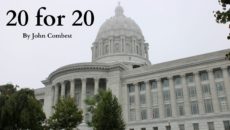Yesterday, in Part 1, we covered the state of Missouri political journalism and how those trends can benefit you and/or your clients. Today, we’ll focus directly on political campaigns.
5. The predominant ideology in newsrooms has shifted from “punching-up” liberalism to white guilt. I’ve seen no empirical psychology surveys of the journo crowd lately, so let’s note recent virtue signaling. In December 2020, the Kansas City Star apologized for its history of excessive whiteness dating back to 1880. Decade by decade, the paper’s current staffers detailed how the previous regimes of editors, reporters, and most everyone else at the office were bigots. More recently, the Springfield News-Leader reported on its progress in diversifying its newsroom — it appeared to hire one (1) black person in the previous year.
If you believe diversity quotas will lead to higher-quality political journalism, good for you.

Missouri conservatives howl “liberal!” at journalists all day, with marginal local empirical evidence to back up their claims. But lack of diversity in Missouri newsrooms is a statistical fact, and the most “woke” of the palefaces are most sensitive to that fact.
6. Actionable item: White journalists’ shame and guilt, on top of corporate diversity, inclusion and equity (DIE) quotas, provides a profitable path to a Democratic consulting business we’ll call “Black John Hancock.” Maybe just B.J. Hancock for short. Corporate newspapers, progressive content creators, and television and radio stations need strong Democratic analyst voices for the 2022 and 2024 cycles. Which race and gender combination is most qualified to speak for the Missouri Democratic Party’s base? If you answered anything other than “a black woman,” — congrats — you’re a bigot, and probably would have fit in well at the Kansas City Star from 1880-December 2020.
To be clear, the real John Hancock is an actual political scientist — a degree from UMSL, years of service as a state rep, two-time statewide candidate, and undoubtedly Missouri’s most prolific Republican media consultant/analyst of the modern era. Unfortunately for Missouri Democrats, nobody in their ecosystem can match this resume while still ticking the two most important diversity boxes — race and gender.
B.J. Hancock need not have decades of experience under her belt. What she does need is the gumption to get TV producers and newspaper editors on a Zoom call — then ask them what percentage of campaign experts featured in their political coverage are women of color. She needs the patience to sit quietly while pasty pencilnecks struggle to hold up heavy heads and stammer that “well, frankly, we haven’t really done a very good job representing the diversity of our audience.” And boom, the hook is set.
Much like the talk radio hustle (No. 4), everyone wins in this scenario. The corporate newspapers and television stations win by ticking two diversity boxes every time B.J. appears in print or on camera. Progressive content creators will amplify her thoughts on every political, legislative, and social happening. And as she elevates her profile to a statewide presence, B.J. Hancock can make a convincing pitch to every statewide Democratic candidate that they need her consulting services. If she isn’t handed a retainer with credible Democratic U.S. Senate candidates Lucas Kunce or Scott Sifton early in 2022, she can always sign on with one of the diversity candidates set to finish third or below in the primary. Done properly, B.J. Hancock can serve as a rainmaker for a broader network of Democratic operatives (think digital consultants, field organizers, et al.) and corner the market for 2024.
7. Quixotic Twitter-obsessed candidates are the new Instathots. Contrary to gynocentric coastal thought pieces and fake Facebook “whistleblowers,” social media is not universally destroying youths’ self-esteem. On the contrary, apps like Instagram give young people an artificially inflated sense of their dating marketplace value. Twenty years ago, an 18-year-old in rural Missouri received superficial external validation primarily from men (or women) in their hometown. Today, posting a flattering swimsuit picture of themselves on Instagram can score thousands of “likes” from low-value simps around the world. Suddenly an objective 6/10 behaves as if they are an 8/10 and gets angry when real-life people in their town do not react accordingly. (Credit to Rollo Tomassi and Richard Cooper, two global experts in intersexual dynamics, for the promulgation of this truth.)
Twitter has the same effect on quixotic vanity candidates. You see them almost every time you open your Twitter app, usually chirping at the other party’s top elected officials or consultants. Their most incendiary tweets score high engagement rates from followers across the state (and country), giving the candidate an inflated sense of in-district support. Campaign curmudgeons like to say “yard signs don’t vote” — well, neither do Twitter “likes.”
8. Actionable item: There’s a blue ocean of opportunity for someone to run the online fundraising operations of Missouri’s Twitter-obsessed also-rans. Established, credible and professional fundraisers won’t waste their time fussing with quixotic candidates running vanity campaigns in unwinnable districts. But for a political entrepreneur with a functional social media addiction and some salesmanship, running an online-only fundraising campaign for fringe candidates is an asset-light model with virtually no competition.
Potential indignation-machine fundraisers, capture this bullet and shoot your shot the next time Rowdy Dowdy Piper pops up in your feed cutting a WWE-style promo. He’d be better off calling donors and having an experienced digital team manage the campaign’s social, but that requires self-awareness and discipline. Besides, he’s running in what will be an unwinnable district. Send him a proposal to run his digital fundraising operation, keeping a tidy 15% commission (after software fees) of all money raised off social. Encourage the candidate to keep picking fights (“Stand up for yourself!”) to generate impressions and click-throughs to your fundraising link.
Run this commission-only model through the 2022 cycle, then move to a contract + commission model in 2024. Remember: Always appeal to candidates’ vanity and ego, not their rationality or sense of public duty. This ensures you’ll never run out of clients.
In Part 3, we’ll pick up the Rowdy Dowdy Piper thread and show how to implement the psychology of pro wrestling into your campaigns — and we’ll even identify the top candidates to be Missouri’s next archvillain.

John Combest began publishing johncombest.com daily in October 2001 to centralize Missouri political news and decentralize truth. You can reach him at john@johncombest.com, or follow him on Instagram (@johncombest_com) and the brand-new johncombest.com Twitter account (@johncombest_com.) He grew up in Spanish Lake and currently lives in Chesterfield.









